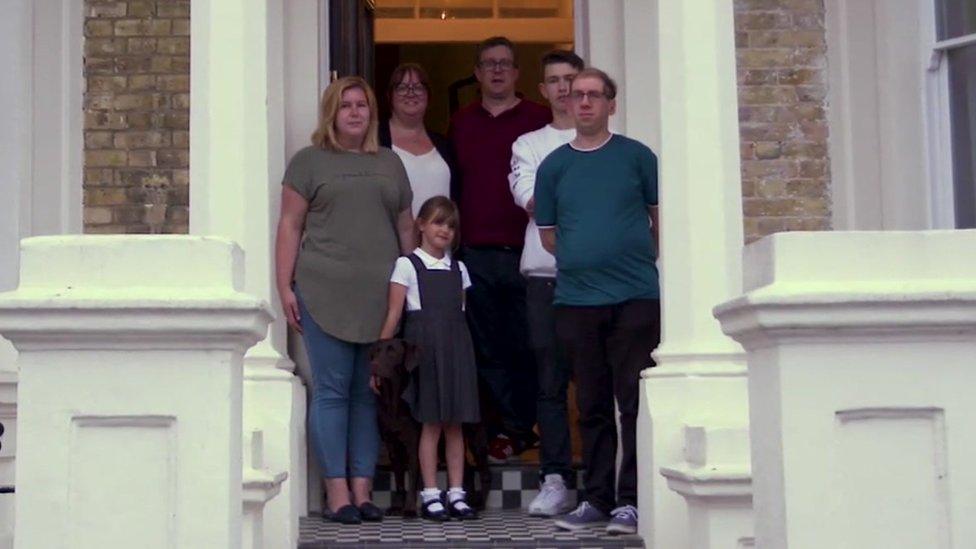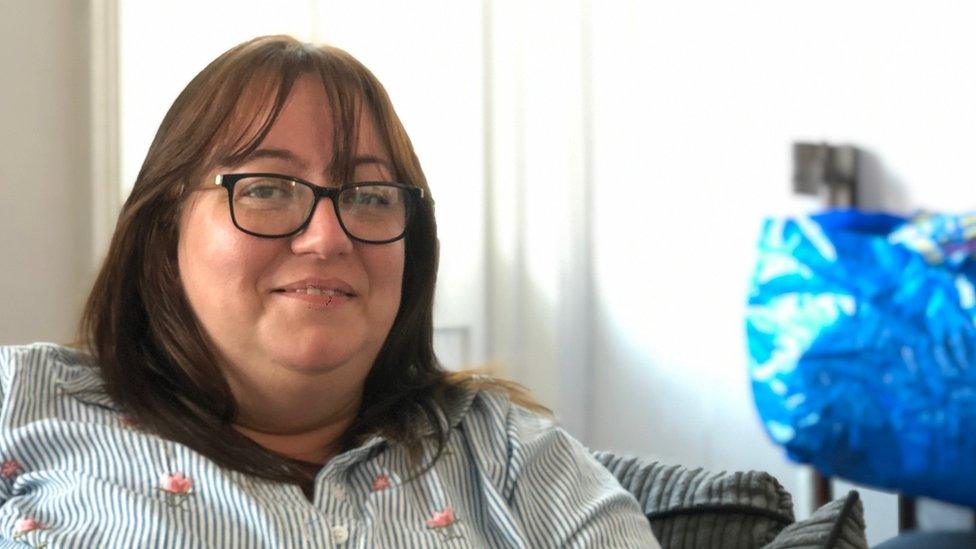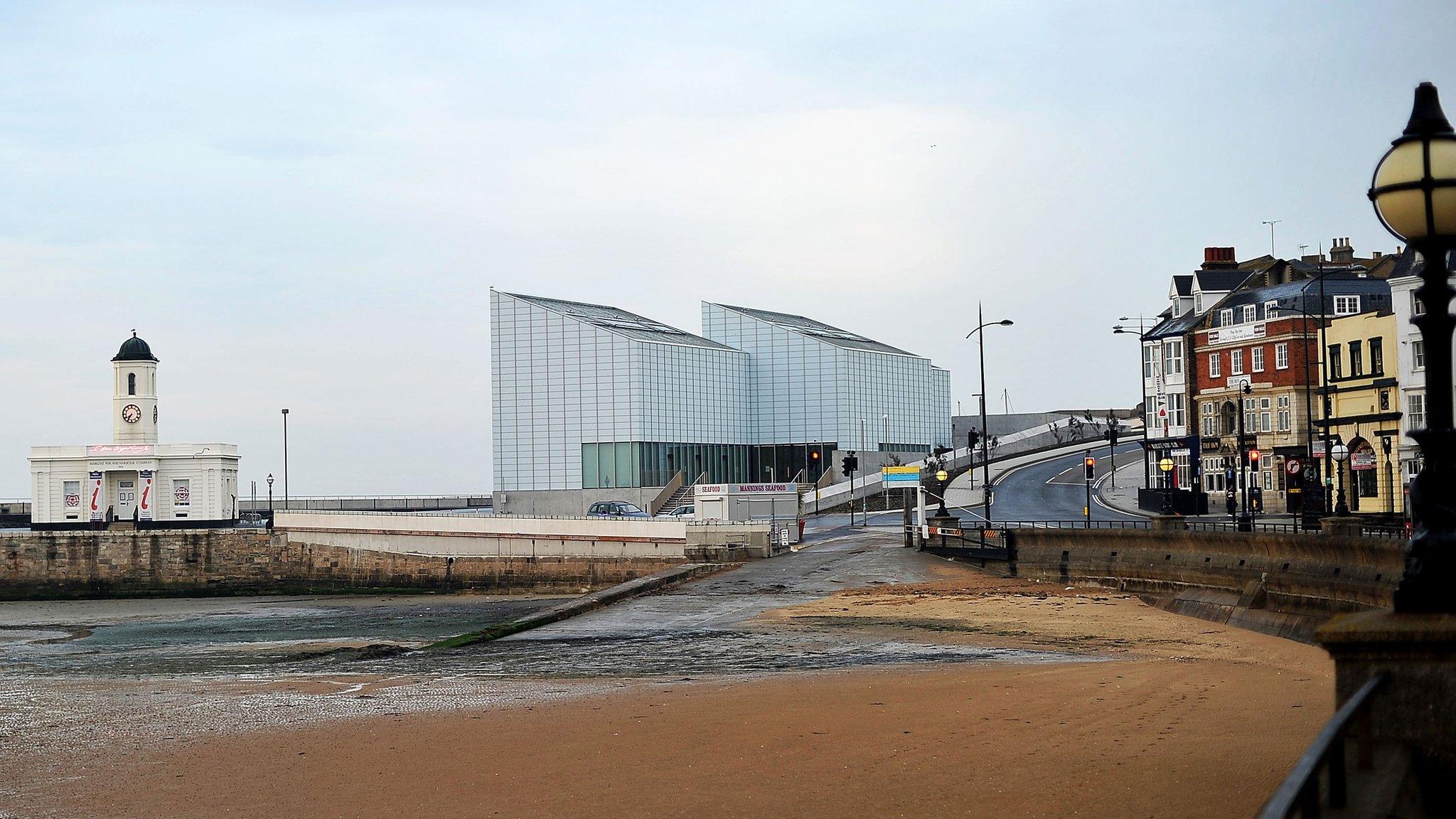Three generations under one roof to beat the housing crisis
- Published

The family used to live in three different homes across Margate
Could moving three generations of the same family into a specially-adapted home be a solution to the UK's housing crisis? The Victoria Derbyshire programme met a family who have been taking part in an experiment in Kent.
"It's really nice, because we've got quite a small family, so it's nice to see each other all the time," says trainee chef Dan Cotter.
The 18-year-old lives with his mum, her partner, his sister, niece and uncle in a specially-converted home in the seaside town of Margate.
It is an unusual set-up, pioneered by Kent County Council - which bought the run-down former hotel for £150,000 - and Thanet District Council, as part of a regeneration scheme in one of the most socially-deprived areas in the UK.
Almost £1m was spent converting it into a home appropriate for multi-generational living. Situated over five floors, it has three kitchens, five bathrooms and seven bedrooms.
The Cotters previously lived in three separate homes around the town.
Hospital sister Lizi lived with her fiance Richard, a chef, and Dan. Andrew, who works in a greenhouse nursery, lived on his own, while single mum Charli, who works in a supermarket, lived in another home with her six-year-old daughter Poppy.
Saving money
Lizi spotted an advert for the experiment after her landlord said he was selling up. She fell in love with the house as soon as she saw it and persuaded the family to move in together.
"We had to go through an interview process with the university, the council, the letting agents and the people in charge of the regeneration project," she explains. "So it was quite a long interview."

Lizi says she hopes the family can stay in the house "forever"
The family are privately renting the house from Kent County Council for around £1,750 a month, plus bills - and say living together has helped them save money.
"We're not all paying rents," Richard Warrington, whose previous property cost £1,200 per month, explains.
"We're not all paying separate electricity bills, gas bills, water bills, council tax and everything else. So we're all now paying one lump sum for the house."
The house was also designed to ensure it met high environmental standards.
For example, water from the washing machine is recycled for use in the toilet, which means a household of six people uses the equivalent of a two-person household.
Academics are monitoring how warm the house is, how much fresh air it has and how much condensation there is.
Childcare help
The impact of the family living together on care costs is also part of the study.
When they lived on their own, Charli used to struggle juggling child care for Poppy while she worked shifts. But now the family live together, she has more help.
"My hours do change, sometimes from week to week, so it does make it a little bit difficult with school runs. But with a little bit of help on hand now it's nice she's still being picked up by a family member," she says.

Andrew says he did not see as much of his family before
Andrew, who has learning difficulties, is also feeling the benefits.
Lizi explains he has always lived an independent life, but had struggled to look after himself.
"He's always been a bit of a loner, and quite happy in his own company, which is good, but he really alienated himself from the family and kept himself very secluded," she explains.
But for Andrew, joining the rest of the family in the house was an easy decision.
"When Lizi said, 'Oh, do you want to move in with us?' I said, 'Yeah, sure'. Because when I was on my own and I was working quite a lot, I didn't get to see much of them."
Hannah Swift, one of the academics who has been studying the family, said the factors which would make multi-generational living a success, vary from family to family.
"So the family that is living here has very specific care needs," she says. "Other families will have different care needs. And the building itself will have to lend itself to that."

Richard says the family have plenty of space
Like all families, there are fallouts from time-to-time.
"As for domestic quarrels in the house, yes they do happen. But we all have our own space," Richard explains.
Nick Dermott, heritage adviser for Thanet District Council, which contributed £74,000 to the refurbishment, says he believes it was a good use of taxpayers' money.
"It's an exemplar to other authorities as to what they can do with their historic housing stock, which is so often blamed as being the cause of the social ills in those areas. And if that stops buildings being demolished - which I hope it will - that has saved the entire country money."
Dr Swift says that while the house has worked for this family, it might not work for everyone.
"Not everybody gets on with their own family, of course," she says. "But I think it's a solution that many people are looking for, and would like to have in the future."
The family, which have lived there for a year, have had their contract extended for a further 12 months. But Lizi hopes it will be their home for many years to come.
"We've talked about the future quite often. They've given us an almost-guarantee that this would be a long-term thing," she says. "And it would be lovely that this would be our forever home."

Follow the BBC's Victoria Derbyshire programme on Facebook, external and Twitter, external - and see more of our stories here.
- Published4 October 2019
